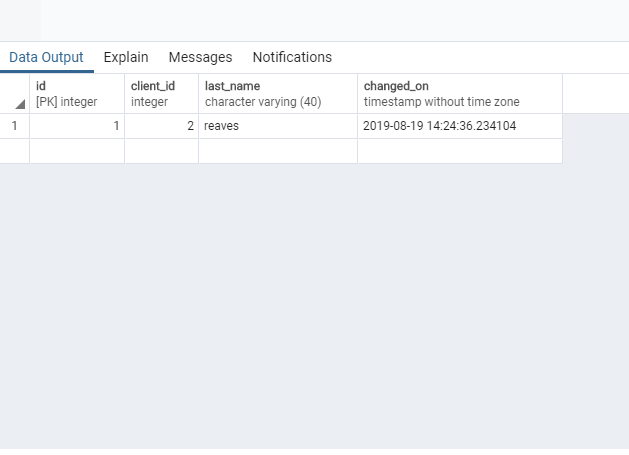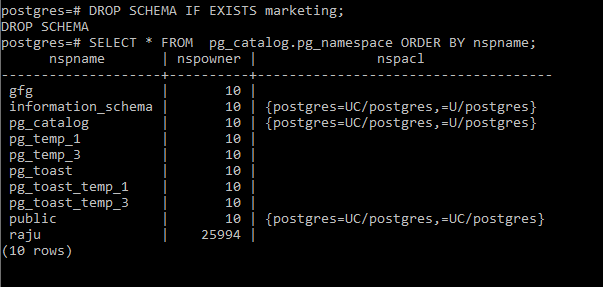
- #POSTGRESQL ALTER TABLE DROP TRIGGER EXAMPLE HOW TO#
- #POSTGRESQL ALTER TABLE DROP TRIGGER EXAMPLE UPDATE#
Great tip: didn't know about user-definable Context_Info. and also is context_inf o() value will be available on linked server Great Article.It really helped me solving my problem.Ĭan we alter trigger on a linked server. Signifies this than new Context_Info value will persist during time? Must I save and restore CONTEXT_info values? Can I Do? (.) When you issue SET CONTEXT_INFO in a stored procedure or trigger, unlike in other SET statements, the new value set for the context information persists after the stored procedure or trigger is completed. I plan use this mechanism in a stored procedure and there is a note in sql documentation (from Microsoft in Context_info topic) that worry me: SELECT * FROM OPENROWSET(BULK.) with the WITH(IGNORE_TRIGGERS) table hint.Ĭontrolling Trigger Execution When Bulk Importing Data Note that for certain cases, there's also the option to not execute triggers with BCP, BULK INSERT, and even INSERT. Thursday, Septem11:49:44 AM - Additional Notes afterwards because the value remains persistent to the SPID which will potentially be recycled if CONNECTION POOLING is in use Wednesday, Febru10:46:43 AM - Simon JonesĮxcellent solution! Though it is worth noting that the CONTEXT_INFO needs to be set back to 0x000000. Saturday, Janu11:13:07 AM - Kleidi KumbaroĬan the context info be set on a procedure from another database (same instance) and be seen from the current db on the insert trigger? What I want to achieve is the trigger not to run when the inserts are performed as a result of a data transformation on another database from a stored procedure I didn't quite fall off my chair, but I'm astonished that RBAR should be a design decision.Īnd that started me wondering, how else can single row updates be enforced, as a design decision in a transactional system ?
#POSTGRESQL ALTER TABLE DROP TRIGGER EXAMPLE UPDATE#
It is highly recommended that we should update one record at a time." "This trigger is explicitly implemented to avoid accidental bulk update on customer table.
#POSTGRESQL ALTER TABLE DROP TRIGGER EXAMPLE HOW TO#
The following example illustrates how to change the check_salary function of the salary_before_update trigger to validate_salary: BEGIN ĭROP TRIGGER IF EXISTS salary_before_update You can also wrap these statements in a transaction. In order to do so, you can use the DROP TRIGGER and CREATE TRIGGER statements. PostgreSQL doesn’t support the OR REPLACE statement that allows you to modify the trigger definition like the function that will be executed when the trigger is fired. If you use psql tool, you can view all triggers associated with a table using the \dS command: \dS employees The trigger was fired and issued the following error: ERROR: The salary increment cannot that high.ĬONTEXT: PL/pgSQL function check_salary() line 4 at RAISEįinally, use the ALTER TRIGGER statement to rename the before_update_salary trigger to salary_before_update: ALTER TRIGGER before_update_salary

Third, create a before update trigger that executes the check_salary() function before updating the salary.įourth, insert a new row into the employees table: INSERT INTO employees(first_name, last_name, salary)įifth, update the salary of the employee id 1: UPDATE employees RAISE 'The salary increment cannot that high.' IF (NEW.salary - OLD.salary) / OLD.salary >= 1 THEN Second, create a function that raises an exception if the new salary is greater than the old one 100%: CREATE OR REPLACE FUNCTION check_salary() Third, specify the new name of the trigger after the RENAME TO keyword.įirst, create new table called employees: DROP TABLE IF EXISTS employees Įmployee_id INT GENERATED ALWAYS AS IDENTITY,.Second, specify the name of the table associated with the trigger after the ON keyword.DDL events include operations such as CREATE, ALTER, and DROP statements on tables, indexes, and other database objects. First, specify the name of the trigger that you want to rename after the ALTER TRIGGER keyword. Triggers on Data Definition Language (DDL) events are a powerful feature of PostgreSQL that allows you to perform additional actions in response to changes to the database schema.The following shows the syntax of the ALTER TRIGGER statement: ALTER TRIGGER trigger_name


The ALTER TRIGGER statement allows you to rename a trigger. Introduction to PostgreSQL ALTER TRIGGER statement Summary: in this tutorial, you will learn how to use the PostgreSQL ALTER TRIGGER statement to rename a trigger.


 0 kommentar(er)
0 kommentar(er)
